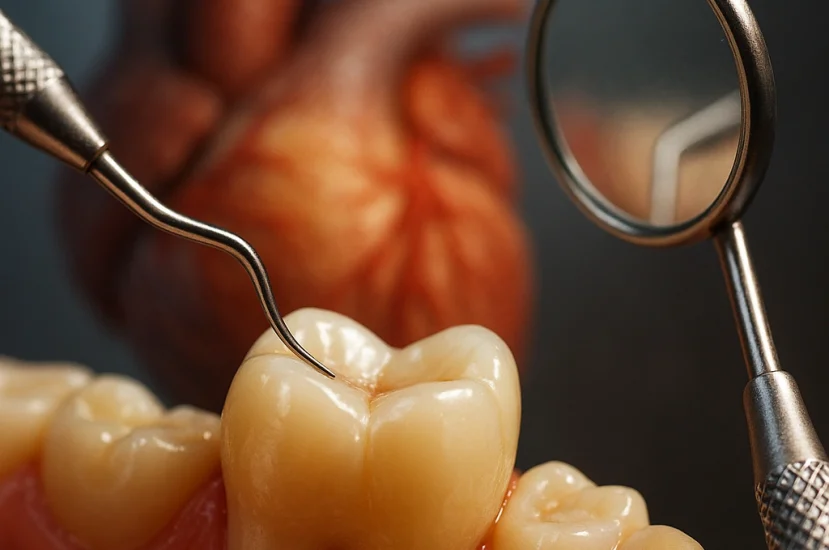We’ve long known the usual suspects behind heart disease: high cholesterol, genetics, smoking. But what if a key accomplice has been hiding in your mouth this whole time?
New research is turning a sharp eye toward an unexpected player in our number one killer: the very bacteria that cause dental plaque. A study in the Journal of the American Heart Association performed a kind of molecular autopsy on patients who died suddenly from cardiac events. Deep within their clogged arteries, researchers found the DNA of common oral bacteria. This isn’t just a coincidence; it’s a clue that the inflammation brewing in your gums might be scripting a disaster for your heart.
An Old Theory Gets a Second Shot
The idea that infections could trigger heart trouble isn’t new. It fell out of favor years ago when simple antibiotic trials failed to stop heart attacks. But science has sharper tools now. We can find genetic whispers of bacteria that were invisible before, and it’s forcing a major rethink.
“Our technology lets us see the unseen,” says Dr. Pekka J. Karhunen, the study’s lead author from Tampere University. “We’re finding bacterial signals in arterial plaque that we couldn’t detect two decades ago. It suggests these microbes are active participants in the inflammation that destroys arteries from within.”
The Bacterial Highway to a Heart Attack
Here’s how researchers believe it works: The bacteria that peacefully live in the sticky plaque on your teeth can escape. If your gums are inflamed and bleed, these microbes get a free pass into your bloodstream—a condition called bacteremia.
Once inside, they don’t just vanish. They can lodge themselves into the fatty plaques already lining your coronary arteries. Your immune system spots these foreign invaders and launches a ferocious attack. This creates a simmering fire of inflammation inside the plaque wall, weakening it until it becomes like an overcooked piece of pasta—ready to rupture. When that plaque cap tears open, it triggers the blood clot that causes a heart attack.
Why This Changes the Conversation
This isn’t just academic. It shifts the heart disease conversation firmly toward inflammation. For cardiologists, it’s a missing piece.
“We’ve known inflammation is the match that lights the fuse for a heart attack, but we’re still identifying all the sources of that spark,” notes Dr. Sergiu Darabant, a cardiologist not involved in the study. “If oral bacteria are one of them, it radically expands our view of prevention. Suddenly, flossing isn’t just about fresh breath.”
But experts urge a dose of realism. Finding bacteria there doesn’t conclusively prove they caused the heart attack. “It’s a powerful association, but we need more data to prove the timeline,” cautions Dr. Yu-Ming Ni, a cardiologist. “We have to see if the bacteria arrive before the plaque becomes unstable.”
What You Should Do—And Not Do
First, don’t panic. These bacteria are normal. The problem isn’t their existence; it’s when they escape their designated zone due to poor oral health.
“The goal isn’t to live in a sterile bubble,” says Dr. Brett Sealove, a chief of cardiology. “The goal is to maintain healthy gums so these bacteria stay where they belong. Neglecting your teeth isn’t just a dental problem—it’s a systemic risk.”
The prescription is straightforward, and it doesn’t involve stockpiling antibiotics. It’s about consistent, meticulous oral hygiene and never ignoring gum disease.
“An infected tooth or severely inflamed gums is an open wound,” explains an infectious disease specialist. “It’s a direct port of entry for bacteria into your circulation. Getting it treated is a non-negotiable part of protecting your overall health.”
This research drives home a critical point: the body is deeply interconnected. The same inflammation you can taste in your mouth might be writing a prescription for your heart. So the next time you brush and floss, know that you’re doing more than saving your teeth. You might be guarding your heart.
